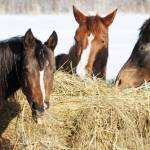Horse-Feeding Problems: Managing Easy and Hard Keepers Together

Managing a mixed bag of horses frequently puts horse owners in a conundrum, especially when it comes to feeding. With limited land and the desire to maintain horses in a social setting, how do you keep an easy keeper from gaining excess weight while bolstering condition of a hard keeper? Consider these tips to ensure all members of the herd are optimally managed.
- Accurately assess the body condition score (BCS) of all horses weekly, and keep a record of those scores. Any deviation from a BCS of 5, 6, or 7 requires intervention.
- Weigh hay and take the amount of pasture turnout time into consideration to ensure all horses are receiving 1.5-2.5% of their body weight in forage each day. For easy keepers, this may decrease to 1.25%, which means they need less supplemental hay. Bear in mind that horses typically consume 1-1.5 lb of forage per hour on a dry matter basis when grazing at least adequate forage.
- Avoid the round-bale frenzy. Yes, it’s a time saver to buy round bales, but horses treat them like an all-you-can-eat buffet. Not only do easy keepers not require a buffet, obese horses tend to be more dominant, excluding hard keepers from the feast. Plus, round bales may be detrimental to horses with breathing problems.
- Use a well-fitted grazing muzzle to limit forage intake in easy keepers when necessary. Alternatively, use drylots and pasture rotation to decrease intake. Feed supplemental calories in the form of well-formulated concentrates to hard keepers once or twice daily, following the manufacturer’s recommendations.
“For many horses, concentrates and oil are typically the go-to products for providing extra energy. Don’t forget that super fibers, such as beet pulp and soy hulls, also serve as excellent sources of calories,” reminded Kathleen Crandell, Ph.D., an equine nutritionist with Kentucky Equine Research.








